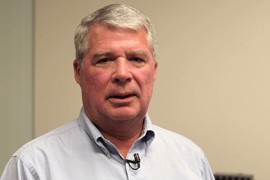Cronkite News has moved to a new home at cronkitenews.azpbs.org. Use this site to search archives from 2011 to May 2015. You can search the new site for current stories.
Libertarian, Green parties: Proposition 121 would put us out of business
PHOENIX – It’s already an uphill battle for Libertarian and Green party candidates in Arizona, but no matter what they have a place on the ballot.
However, leaders of both parties say a measure on the November ballot threatens to butt them out of elections for good.
“Third parties will be completely gone,” said Warren Severin, chairman of Arizona’s Libertarian Party.
Proposition 121, the Open Elections/Open Government Act, would replace the current partisan primary system with a single primary that advances the top vote-getters regardless of party.
Severin and Angel Torres, co-chair of the state’s Green Party, argue that this system would make it nearly impossible for their candidates to advance into the general election because they’d have to beat out major party candidates.
“If you are a Libertarian or a Green voter your candidates are almost guaranteed not to move on to the general election,” said Torres, who also is a candidate for state House in a Phoenix-area district.
They also say Proposition 121 would dramatically boost the number of signatures third party candidates would have to gather, making it more difficult for them to qualify for the primary.
At present, the number of signatures required to get into a party’s primary is one half of 1 percent of those registered in that party across Arizona for statewide races or in a district for legislative or congressional races.
Proposition 121 would make the signature requirement a function of total votes cast in the previous election and require the same number of signatures for all candidates.
“Third party candidates who have neither large supporter bases nor lots of money will be left out of the picture, especially in larger districts where larger numbers of signatures are required,” Severin said.
Barbara Norrander, a political science professor at the University of Arizona, said a top-two system could harm third parties.
“It would make it much more difficult to get on the general election ballot because they would have to get more votes than they have been getting in prior elections,” Norrander said.
Severin, the Libertarian chairman, said the main goal of third parties isn’t winning but providing voters with new ideas. He said a top-two primary would kill any chance of third parties participating in debates, the main vehicle for sharing their ideas.
“Our opportunity to do what really is our goal vanishes,” Severin said.
The Open Government Committee, which put the measure on the ballot, contends the change would produce more moderate candidates, increase primary election turnout and offer independents a better chance to compete.
Former Phoenix Mayor Paul Johnson, one of the group’s leaders, said it’s “false” to say that third parties would wither if Proposition 121 passes. They’d just have to gather the same number of signatures as any other candidate and fight to make it to the general election, he said.
“We are not doing this for any party,” Johnson said. “We are not doing it for them, nor are we not doing it to hurt them. We are doing it for the voters.”
Joe Pamelia, a Libertarian candidate for U.S. House of Representatives in District 4, said unless a candidate in a top-two system is either with a major party or extremely wealthy he or she doesn’t stand a chance of making it to the general election.
“[Top two] says to me, ‘I’m sorry you weren’t able to make enough votes to even compete with us, you’re out the door and so we hold the power and we are going to continue to hold power,’” Pamelisa said.
Johnson said the signature requirement change proposed in Proposition 121 would help independent candidates because they currently need a greater number of signatures to get into the general election.
The requirement for independents to get on a general election ballot, because independents don’t have primaries, is 3 percent of registered voters not affiliated with an established party.
For example, to get on the ballot in the 2012 Arizona’s statewide elections Republicans had to gather 5,671 signatures and Democrats 4,765, but independents had to gather 31,111, according to Matthew Roberts, communications director at the Arizona Secretary of State’s Office.
Proposition 121 doesn’t specify what percentage of the total votes cast would be required, but the language says it would be an “amount to be established by law.”
Severin, the Libertarian chairman, said he agrees there should be something done to help independents, but not at the expense of third parties.
“The result will be that very few independents, Libertarians and Greens will make it onto the primary ballot,” he said. “And none of those will ever see a general election ballot.”
Severin and Torres, the state Green Party leader, say what they fear would happen in Arizona is already happening in California, where voters approved a similar top-two system in 2010.
A report by the nonpartisan Public Policy Institute of California said districts with no minor party candidates were 72 percent in 2012, up from 53 percent in 2010.
Eric McGhee, a policy fellow with the group and co-author of the report, said the change in California has hurt third party candidates.
“The main message is that this reform has been hard on them,” McGhee said. “And there is no getting around that.”
David Berman, a senior policy fellow at Arizona State University’s Morrison Institute for Public Policy, said a top-two system in Arizona would put third parties in an “uncomfortable position” and cost them visibility in the general election.
“Given their failure to gather in many votes or win offices even under the existing system, the overall impact of top-two on the success of third parties may be minimal,” Berman said in an email.







